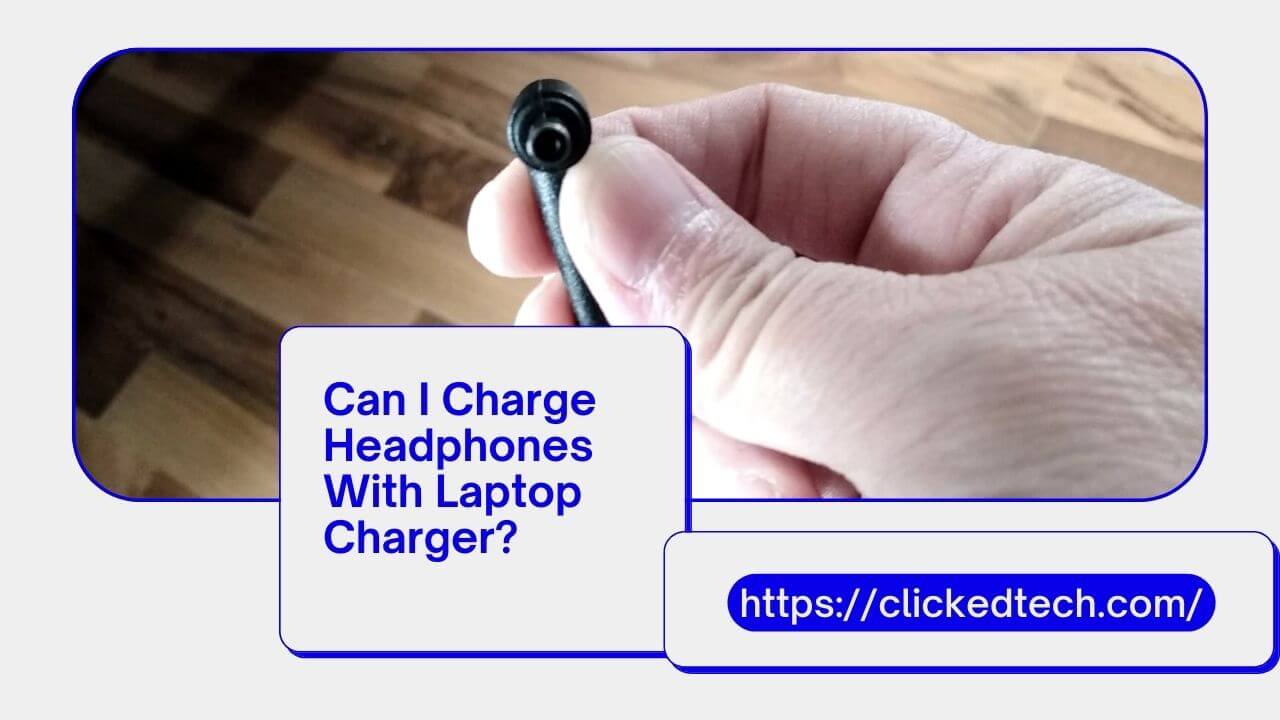Last Updated on December 19, 2022 by Nurul
Are you constantly on the go and need a quick and convenient way to charge your headphones? Or maybe you’re just trying to save money by using a laptop charger instead of buying a separate one for your headphones. Whatever the reason, you might wonder: can I charge headphones with a laptop charger? This blog post will dive into the feasibility of using a laptop charger to charge your headphones, the pros, and cons of this approach, and alternative charging methods to consider. So if you’re curious about charging your headphones with a laptop charger, keep reading!
Contents
- Can I Charge Headphones With Laptop Charger?
- differences between USB-C and USB-A chargers
- Pros and cons of charging headphones with a laptop charger
- Alternatives to charging headphones with a laptop charger
- Frequently Asked Questions
- Can I charge headphones with a 65W charger?
- Can you charge Bluetooth headphones with a laptop charger?
- Can I charge Bose headphones with a laptop charger?
- Can I charge my Sony headphones with my laptop charger?
- Do fast chargers damage headphones?
- Is it safe to charge headphones with a fast charger?
- Is it OK to wear a headset while charging?
- Can overcharging damage headphones?
- Does overcharging a headphone battery damage it?
- Conclusion
Can I Charge Headphones With Laptop Charger?
Yes, it is possible to charge headphones with a laptop charger, but it is important to consider the type of connector your headphones use and the type of charger your laptop has.
If your laptop charger has a USB-C port and your headphones have a USB-C connector, you should be able to charge your headphones using your laptop charger. Similarly, if your laptop charger has a USB-A port and your headphones have a USB-A connector, you can also charge your headphones with your laptop charger.
However, if your laptop charger has a USB-A port and your headphones have a USB-C connector, you will need an adapter to use the charger. It is worth noting that using an adapter may not always be the most efficient or reliable way to charge your headphones, as the adapter may not provide enough power or become loose over time.
It’s important to note that using a laptop charger to charge your headphones may not be the most efficient option. Laptop chargers are designed to provide power to the laptop itself and may not be able to provide enough power to charge your headphones as quickly as a dedicated charger. Additionally, using a laptop charger to charge your headphones may put extra strain on the charger and potentially shorten its lifespan.
differences between USB-C and USB-A chargers
USB-C and USB-A are two types of connectors used to charge and transfer data. The main difference between them is the shape of the connector and the direction in which it is inserted.
Here is a comparison of USB-C and USB-A chargers:
| Feature | USB-C | USB-A |
|---|---|---|
| Shape | Rectangular, symmetrical | Rectangular, asymmetrical |
| Direction | It can be inserted in either direction | Must be inserted in a specific direction |
| Compatibility | It can be used with devices that have a USB-C port | It can be used with devices that have a USB-A port |
In terms of charging headphones, the main difference between USB-C and USB-A chargers is the type of connector that the headphones use. Some headphones use a USB-C connector, while others use a USB-A connector. If your headphones have a USB-C connector and your charger has a USB-C port, you should be able to charge your headphones using your charger. However, if your headphones have a USB-C connector and your charger has a USB-A port, you will need an adapter to use the charger.
It’s worth noting that while USB-C chargers are becoming more common, many devices, including laptops, still use USB-A chargers. Additionally, some devices, such as smartphones, may have both a USB-C port and a USB-A port, which allows for more flexibility in terms of charging and transferring data.
Pros and cons of charging headphones with a laptop charger
Charging headphones with a laptop charger can have some benefits, but it also has some potential drawbacks.
Pros:
- Convenience: Using a laptop charger to charge headphones may be more convenient for people who are always on the go and don’t want to carry multiple chargers.
- Accessibility: If you don’t have a dedicated charger for your headphones, using a laptop charger may be a quick and easy way to charge them.
- Cost-effective: Using a laptop charger to charge headphones may be more cost-effective than buying a separate charger.
Cons:
- Slower charging times: Laptop chargers are designed to provide power to the laptop itself and may not be able to provide enough power to charge your headphones as quickly as a dedicated charger.
- Risk of damaging the headphones or charger: Using a laptop charger to charge headphones may strain the charger and potentially shorten its lifespan. Additionally, there is a risk of damaging the headphones if the charger is not compatible or if the charging process is interrupted.
- Inconvenience: Depending on the laptop charger’s location and the charging cable’s length, it may be inconvenient to use a laptop charger to charge your headphones.
Alternatives to charging headphones with a laptop charger
There are several alternatives to charging headphones with a laptop charger, including:
- Using the supplied charger: Most headphones have a dedicated charger specifically designed for that model. The supplied charger is usually the most efficient and reliable way to charge your headphones.
- Charging from a wall outlet: Another option is to charge your headphones from a wall outlet using a USB adapter. This can be a faster and more efficient way to charge your headphones, especially if you have a high-capacity adapter.
- Charging from a power bank: A power bank is a portable battery pack that can charge your headphones on the go. This is a good option if you can’t access a charger or a wall outlet.
- Using a car charger: If you spend a lot of time in your car, you may be able to charge your headphones using a car charger. Many car chargers have multiple USB ports to charge multiple devices simultaneously.
Frequently Asked Questions
Can I charge headphones with a 65W charger?
Yes, you should be able to charge headphones with a 65W charger as long as the charger has a compatible port and the headphones have a compatible connector.
Can you charge Bluetooth headphones with a laptop charger?
Yes, it is possible to charge Bluetooth headphones with a laptop charger, but it depends on the type of connector that the headphones use and the type of charger that your laptop has.
Can I charge Bose headphones with a laptop charger?
It is possible to charge Bose headphones with a laptop charger, but it depends on the type of connector that the headphones use and the type of charger that your laptop has.
Can I charge my Sony headphones with my laptop charger?
It is possible to charge Sony headphones with a laptop charger, but it depends on the type of connector that the headphones use and the type of charger that your laptop has.
Do fast chargers damage headphones?
In general, fast chargers should not damage headphones as long as the charger is compatible with the headphones and the charging process is not interrupted. However, it is possible that using a fast charger may shorten the lifespan of the headphones or the charger.
Is it safe to charge headphones with a fast charger?
It is generally safe to charge headphones with a fast charger as long as the charger is compatible with the headphones and the charging process is not interrupted. However, it is always a good idea to follow the manufacturer’s recommendations for charging your headphones.
Is it OK to wear a headset while charging?
It is generally safe to wear a headset while it is charging, but it is important to follow the manufacturer’s recommendations and use caution when handling any device that is plugged in.
Can overcharging damage headphones?
Yes, it is possible for overcharging to damage headphones. Most headphones have a built-in protection mechanism that prevents overcharging, but it is still a good idea to follow the manufacturer’s recommendations for charging your headphones to ensure that they last as long as possible.
Does overcharging a headphone battery damage it?
Yes, overcharging a headphone battery can damage it and reduce its lifespan. Most headphones have a built-in protection mechanism that prevents overcharging, but it is still a good idea to follow the manufacturer’s recommendations for charging your headphones to ensure that they last as long as possible.
Conclusion
Here is a summary of the main points to consider when using a laptop charger to charge headphones:
- It is generally safe to use a laptop charger to charge headphones as long as it is compatible with the headphones and used correctly.
- The charger should have a similar output to the charger that came with the headphones in terms of voltage and current.
- Some headphones may not be designed to be charged using a laptop charger, so it is important to check the manufacturer’s instructions before attempting to do so.
- It is a good idea to use a charger specifically designed for the headphones, if possible, as this may help extend the headphones’ life and ensure that they are charged safely and efficiently.
- If you are using a laptop charger to charge headphones, it is important to pay attention to the charging process and ensure that the headphones are not getting too hot or taking too long to charge. If you notice any issues, stop charging the headphones and seek further guidance.

Hi, I’m Nurul! I love touching the latest gadget, unboxing them, and even smelling them! In this blog, I will share all my experiences. Hope you get the right idea about all kinds of gadgets from this blog.

